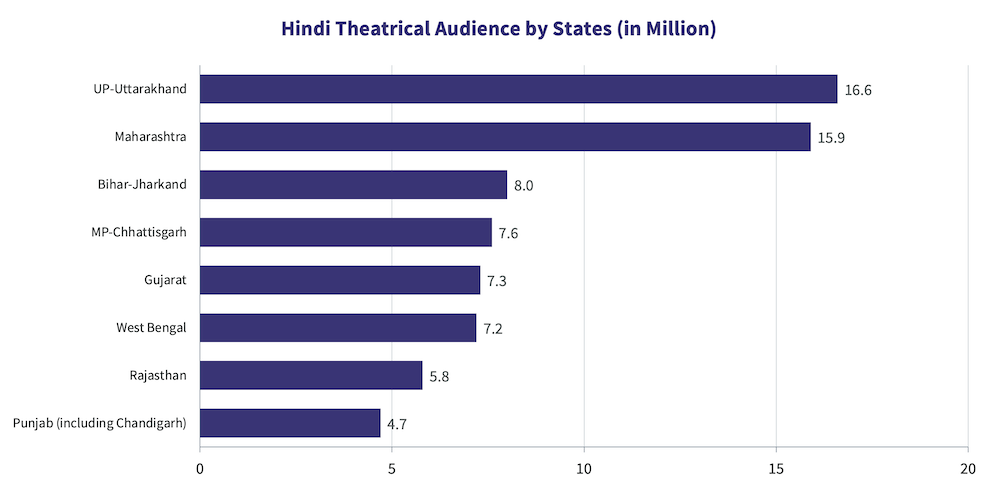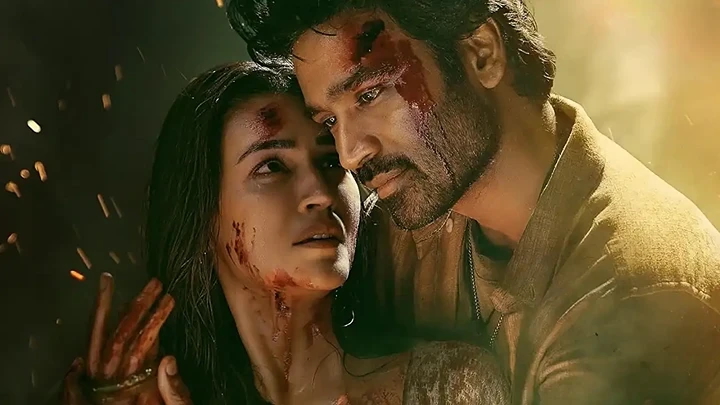


By Shreya Ramakrishnan
The box office success of Chhava makes it the second Hindi film in recent times, following Tanhaji: The Unsung Warrior (2020), that celebrates Maratha culture and heroism, and has resonated strongly with Hindi theatrical audiences, including those outside the state of Maharashtra. This raises an intriguing question: Is the success of such films a Maharashtra-specific phenomenon, or does it signal a broader opportunity for producers to explore historical heroes from other regions of India too?
About 32% of Hindi domestic box office comes from the Mumbai territory, which includes the Mumbai city, the political state of Gujarat, and large parts of the political state of Maharashtra (the rest of the state is a part of other film territories, primarily CP Berar). In contrast, both Tanhaji and Chhaava got about 48% of their domestic box office from the Mumbai territory, i.e., an indexation of 1.5, which would get even steeper if we look at only the state of Maharashtra (excluding Gujarat).

Clearly, these films deeply resonate with audiences from the region to which their celebrated heroes belong. The cultural and emotional connection in their home state is strong enough to drive very high commercial viability, albeit with support from other geographies in the country.
There are some common factors between these two films, that are worth looking at. Both spotlight historical figures who have been under-represented in mainstream cinema, offering audiences a somewhat-familiar yet fresh narrative. The grand production scale and dynamic action sequences elevate these stories, making them theatrical experiences that align with audience expectations today. This reflects in the decision of the producers of Tanhaji to go for a proper 3D release, or in the execution of the climactic sequence in Chhaava.
But more than anything else, both films offer the same central audience benefit: Regional Pride. While national pride has long been a recurring theme in Indian cinema, regional pride remains a largely untapped reservoir. These films cater to a deep-rooted cultural sentiment, specific to Maratha history, culture and heritage.
Regional pride differs from national pride in its emotional texture. National pride often centers on specific achievements of patriotic heroes, while regional pride is more cultural and intimate. For instance, the stories of Chhatrapati Shivaji Maharaj are a cornerstone of Maratha identity, passed down over generations. Bringing these tales to the big screen fulfills a desire to preserve cultural heritage in an era where modernization often feels like it erodes traditional roots. There is no such benefit that national pride offers, as patriotism and nationalism have remained relevant over the decades, even if their interpretation and celebration changes form with time.
India offers a vast and diverse historical landscape with countless untold stories. Pre-pandemic, a film like Kesari (2019) managed something similar, though at a smaller scale. The film, rooted in Sikh valor, saw collections heavily skewed towards the state of Punjab (a part of the East Punjab territory), but also performed well in Mumbai and Delhi. So, can stories high on regional pride resonate beyond their home markets too, or do they come across as ‘regional films’ in Hindi language?
The answer lies in finding the right balance. For films driven by ‘regional pride’ to succeed at a national level, they must resonate with the dominant box office territories of Mumbai and Delhi-UP. This means carefully selecting stories that offer a combination of region-specific authenticity and universal appeal. For instance, Kantara (2022) has deep cultural roots in Karnataka, but its imaginative folklore-style storytelling and universal themes allowed it to connect with audiences in Hindi-speaking markets as well.
So, which states of India should be tapped for the source material of such stories for Hindi theatrical films?
The chart below, from our Sizing The Cinema: 2024 report (read more here), lists the top states or state clusters that contributed more than 4 Million audiences to the 92 Million Hindi theatre-going population in India at the time of that research.

Just numbers, however, do not reveal the full story. States like Uttar Pradesh and Bihar, for example, may have the numbers on their side, but arguably lack ‘regional pride’ as a shared value in their populace. Even more so, they may not have enough ‘heroes’ whose stories have the opportunity to unravel any latent regional pride that may exist. States like West Bengal, Rajasthan and Punjab are better placed on this factor, but do not have the huge numbers of Maharashtra. Hence, a story driven by regional pride from these regions would have to work extra hard in driving universal appeal, for it to achieve blockbuster success.
But every film need not be a ₹300 or ₹500 Crore blockbuster. Tapping into stories that evoke regional pride, while carrying a universal appeal, appears to be a sound premise for theatrical success in a modern, diverse India that’s revisiting its roots more than ever before.

Ormax Cinematix's FBO: Accuracy update (December 2025)
This edition of our monthly blog summarises Ormax Cinematix's box office forecasts (FBO) for all major December 2025 releases vis-à-vis their actual box-office openings

The India Box Office Report: November 2025
November 2025 was an underwhelming month at the India Box Office, recording only ₹587 Cr in gross collections. However, the year stays on course to become the highest-grossing year of all time

Ormax Cinematix's FBO: Accuracy update (November 2025)
This edition of our monthly blog summarises Ormax Cinematix's box office forecasts (FBO) for all major November 2025 releases vis-à-vis their actual box-office openings
Subscribe to stay updated with our latest insights
We use cookies to improve your experience on this site. To find out more, read our Privacy Policy